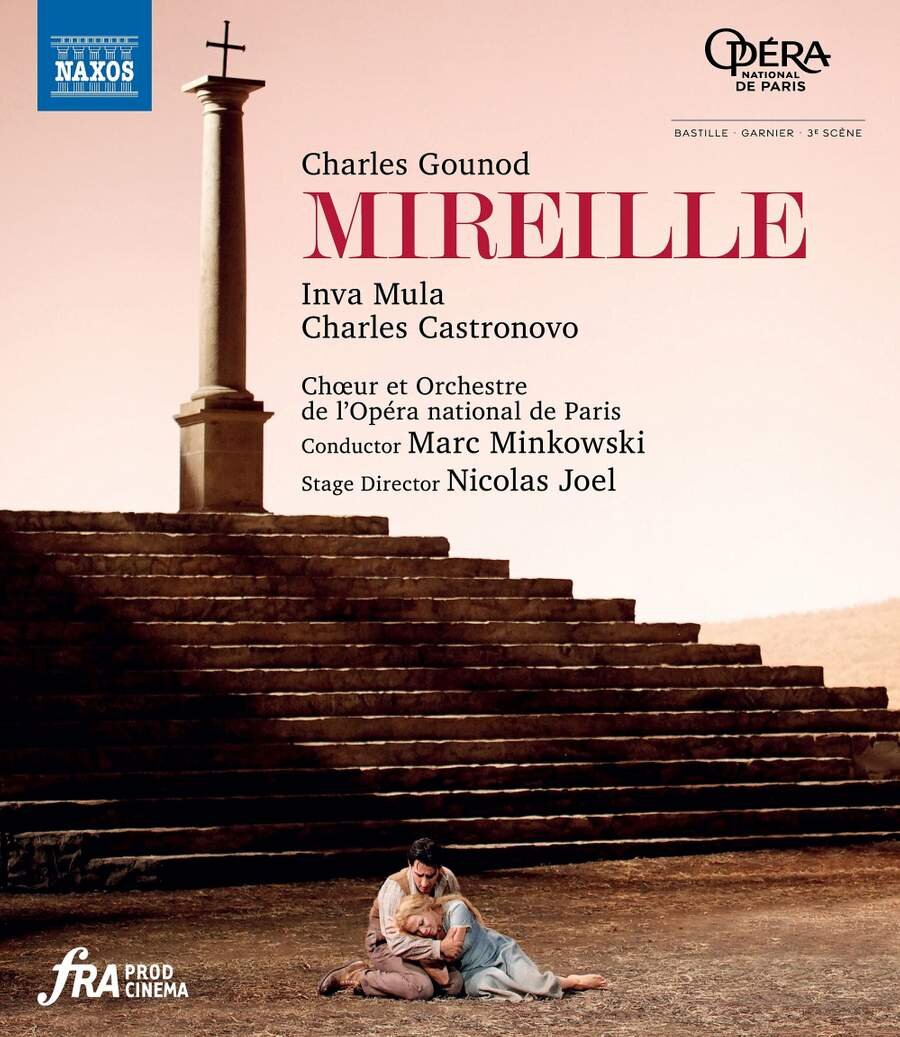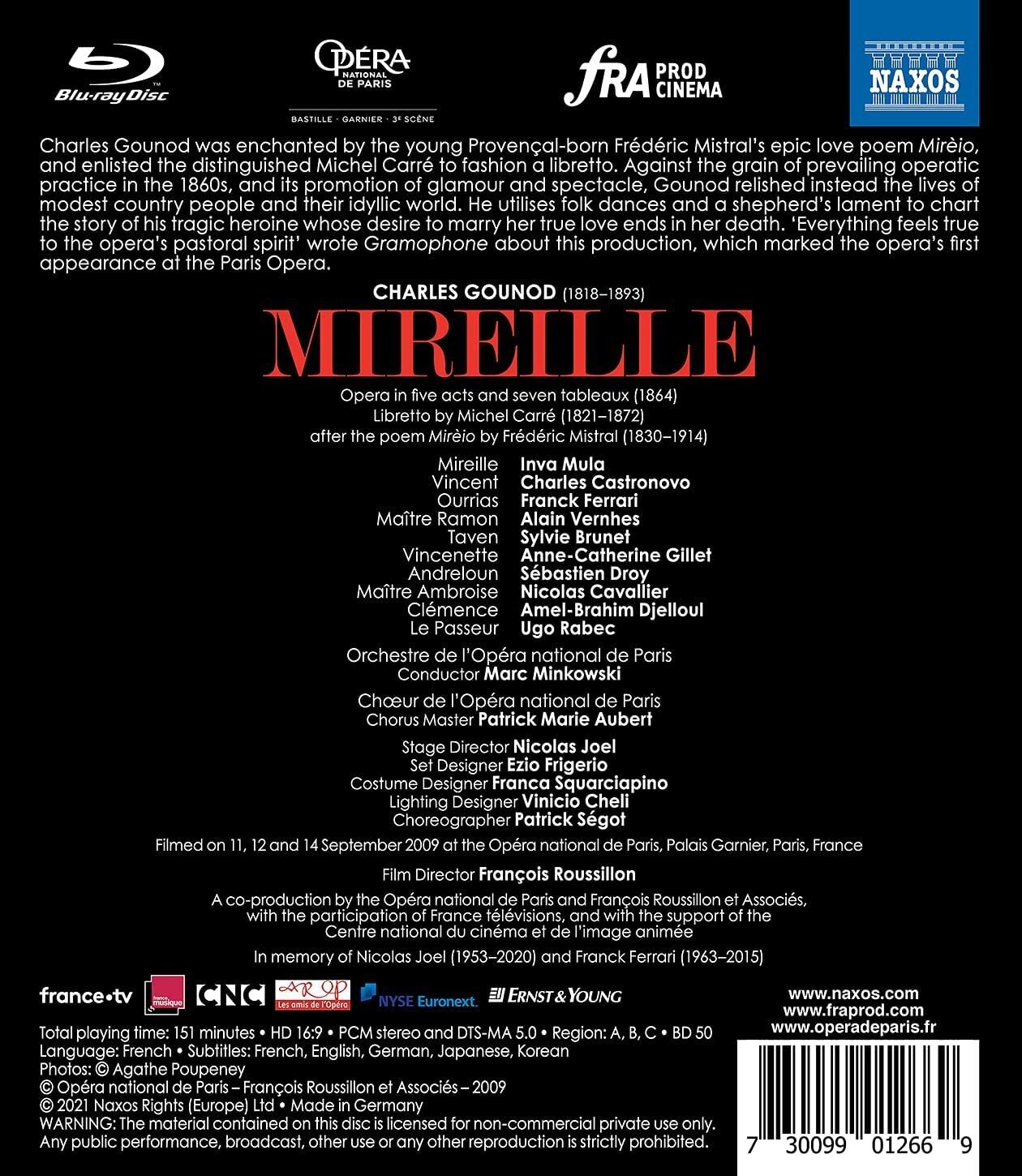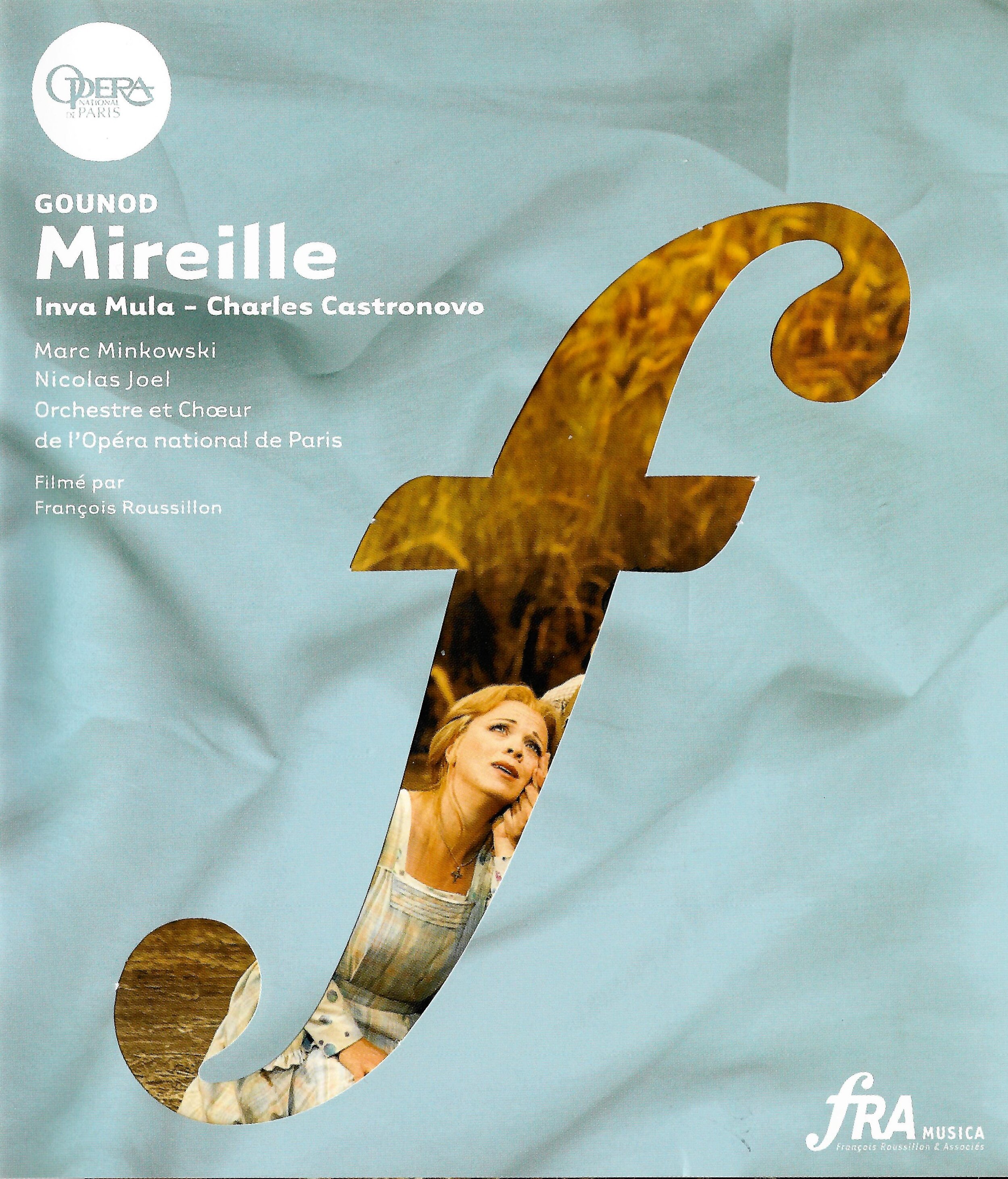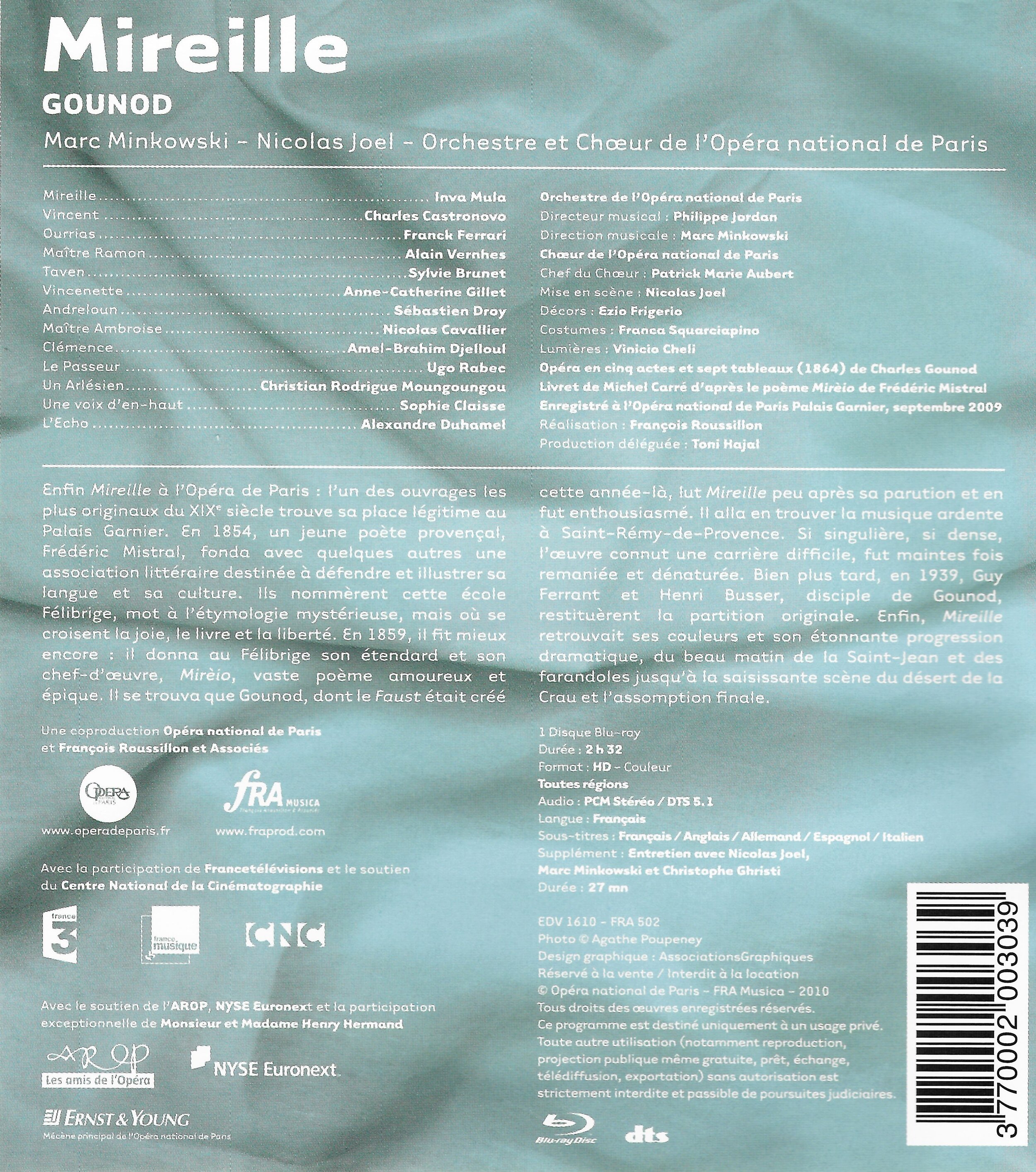



Charles Gounod Mireille opera to libretto by Michel Carré. Directed 2009 by Nicolas Joel at the Paris National Opera. Stars Inva Mula (Mireille), Charles Castronovo (Vincent), Franck Ferrari (Ourrias), Alain Vernhes (Ramon), Sylvie Brunet (Taven), Anne-Catherine Gillet (Vincenette), Sébastien Droy (Andreloux), Nicolas Cavallie (Ambroise), Amel-Brahim Djelloul (Clémence), Ugo Rabec (Ferryman), Christian Rodrigue Moungoungou (citizen of Arle), Sophie Claisse (voice from on high), and Alexandre Duhamel (Echo). Marc Minkowski conducts the Orchestre et Choeurs de l'Opera national de Paris (Choir Master Patrick Marie Aubert). Set design by Ezio Frigerio; costumes by Franca Squarciapino; lighting by Vinicio Cheli; choreography by Patrick Ségot. Directed for TV by François Roussillon. Sung in French. Released 2010, Blu-ray disc has 5.1 dts-HD Master Audio sound. Grade: A+ with the 💓 designation.
This originally came out in 2010 published by FRAmusica in its distinctive design with the “cut-through” front cover shown above in pale blue. Eventually this went “out of print” and became a collectors’ item. Alas, in 2020 I tried to play my 2010 disc and it would not load (due, I guess to the mysterious “disc rot” illness). Thank Goodness I kept this story up on our website—Naxos has the rights to this and has reissued it with new artwork seen on the left in the gallery above. (Let’s hope Naxos will republish all of the other wonderful early FRAmusica titles that went out of print.) Bravo Naxos!
The review below comes from 2010 with few changes. I’m pretty sure the review will hold up fine against the new version.
You can imagine how nerve racking it could be for everyone involved with an opera production to have a recording session also imposed on them. Crews of audio techs and camera operators crawl around getting in the way. It's a bit like letting soldiers and sailors go to the same bar. There's going to be competition for the girls and the whisky, and somebody may wind up with a broken jaw. The best way to avoid these problems is to have the recording forces involved in the production from the beginning. Here's a screenshot showing how the FRA folks dealt with this way back in 2009:
Can you believe your eyes? The people making a recording get equal billing with the Paris National Opera! The video of the opera is just as important as the live performance! The opening of the video is presented with movie-style credits for the star singers, the main executives, plus FRA. All the artists involved did their work with the dual objective of sounding and looking good for the live audience and the video viewers. (In the 2021 Naxos version, you probably will get a different title screen than the image above.)
Next let's look below at a full-stage opening shot of peasant girls bringing in a harvest. There is a lot of light on stage, and the video is both luminous (with a kind of unearthly, hazy glow) and beautifully detailed:
Mireille takes place in the Provence district of France, an arid region with a rugged landscape. Provence often experiences strong winds (up to 60 miles per hour) called the Mistral, which can blow south for days from the Alps through Provence and on out over the Mediterranean Sea. (Note: "Fédéric Mistral" is the name used by of the author of the original epic poem, written in the now all-but-lost Occitan language, about Mireille.) The Mistral winds clear the air and give the region the brilliant light that was prized by the impressionist painters. Director Joel and Roussillon paint the region with a fierce, dry, sandy-pink sky dazzling the inhabitants of a parched domain. Below we see the good sorceress Taven (Sylvie Brunet) approach. Ominously, Taven notes the "happy hearts of the young girls" who still don't understand how quickly things can get tough in life:
Motion pictures have locations and sets that outclass anything you can put on a stage. But for beauty and clarity of the images, especially of actors and their faces, FRA had capabilities to rival what, say, David Lean could do. The rest of the screenshots below provide ample evidence of this. These shots look pretty good even on a computer screen—on my home theater TV display, they are almost unbelievably beautiful both in composition and execution. I never got tired of looking at Roussillon's portraits of Mireille (Inva Mula):
Mireille is the daughter of a prosperous farmer. She is in love with Vincent (Charles Castronovo), a poor but sweet lad who ekes out a living weaving baskets:
Mireille and Vincent entertain the workers by singing a favorite love song:
Taven asks Mireille, "Do you love him?"
Mireille is such a good girl. The sorceress wants to protect her. Taven gently warns Mireille that she may soon be faced with difficult choices:
Troubled by Taven's mysterious warnings, the sweethearts agree that if either of them is in danger, the other will travel to a shrine called the "The Saints" to offer prayers for deliverance:
Mireille and Vincent sing the duet, "Now I believe I am loved." This is the happiest hour of Mireille's life. It will also be the last happiness she will know:
Ourrias (Franck Ferrari) is a properous cattleman and bull-tamer. He's a good man, match, and catch; but he's not Mireille's basket-weaver. He has already arranged with her father to marry Mireille. Here he pours out his heart in a futile effort to seal the deal by winning her over. Note the flowers on the cart. In my HT, they look like Van Gogh painted them for set designer Ezio Frigerio:
Mireille rejects Ourrias, and her father, Ramon (Alain Vernhes), goes into a rage. Below we see Ramon, Vincent, Vincent's sister Vincenette (Anne-Catherine Gillet), Mireille, and Vincent's father, Ambroise (Nicolas Cavallie). Ramon grandly insults everyone shouting, "Disobey me and you'll be begging for your food from door to door!"
Ramon then exercises his prerogative and forcibly takes Mireille back to the their homestead:
So Mireille and Vincent are separated. Eventually, Mireille learns that Ourrias used his cattle prod (his "trident") to strike Vincent down on a road through the Val d'Enfer (Valley of Hell). Mireille tells Vincenette of Mireille's resolve to honor the only vow she has been allowed to make to Vincent. She will trek by foot to pray for him at the shrine at Les Saintes-Maries-de-la-Mer.
I suppose Mistral's poem describes in detail Mireille's path to Les Saintes-Maries-de-la-Mer. Just looking at my Michelin map of Provence, I imagine Mireille had to pass through the Valley of Hell and then cross both the barren Crau desert and the treacherous marshes of the Plain of Camargue. I imagine the mistral started blowing at 60 per hour and Mireille lost her hat and provisions. When the air turned still again; she was at the mercy of the sun:
"The sun has wounded me":
Mireille almost gives up. But she is revived by the distant sound of a shepherd's pipe:
Supplicants gather every day at Les Saintes-Maries-de-la-Mer (The Saints Marys of the Sea) a commune with a fortified church on the coast of the Mediterranean Sea south of Arles. (The Marys referred to are Mary Magdalene, Mary Salome, and Mary Jacobe, the first witnesses to the empty tomb of Jesus.) Note here Roussillon's balanced use of long-range, medium-range, and near-range shots together with close-ups:
"You Saints in Heaven, hear our prayers!":
Everyone realizes Mireille is in danger. Mireille's father, now full of remorse, and Vincent with his family have arrived at the shrine to look for her. But they are too late. Stricken by the sun, Mireille arrives hallucinating about her entrance into a "fiery" heaven. Death from sunstroke and heat exhaustion is near:
A choir from heaven reports, "She has taken flight." Darkness descends as Mireille climbs the steps to the cross:
It's such a simple little story, but it's so well told. The credited stars were all perfectly cast for appearance, singing skill, and acting ability. Gounod's score is full of melodies for the singers as well as evocative and dramatic segments for the orchestra. The audience at the Palais Garnier provide warm applause for the singers and orchestra throughout.
I should also mention that the bonus supplement to the opera is one of the best I've seen with our HDVDs. Christophe Ghristi, Nicolas Joel, and Marc Minkowski give relaxed but apt and intelligent mini-lectures in which they stay on a well-edited script. And the supplement is photographed in startlingly beautiful HD and fine sound. (H’m, do you think Naxos will include these excellent extra features in their new title?)
The only possible criticism of this disc would be to assert that Mireille is a minor work set in an obscure time and place and that it relies too much on sentiment. But this doesn't hold up. The Mistral poem was written in Occitan as an effort to memorialize the nobility of the culture of Provence. In 1904, Mistral received the Nobel Prize for Literature for this. Well, I don't think the people of Provence are still trying to start their own county, but their region has achieved a fame that's out of proportion to their numbers. And when I see Inva Mula in this, she's so good, I see realism rather than sentimentalism. (By the way, Mula is also still the best Mimi in La Bohème that I've ever seen.)
When this first came out, it got good reviews in the International Record Review and in The Opera News. Gramophone gave it an Editor's Choice designation as a DVD without even being aware that it's also available in Blu-ray. Neil Fisher reviewed this in the September 2021 Gramophone again (page 74). He explains why I like this opera so much. Mula “attacks the testing title-role with spirit and agility” and “as actress she can make us fall for her utterly.” At this point, Mula could make you think she was a young girl even though she was heading into retirement. “ And even Joanne Sydney Lessner, who gave this a luke-warm review in the November 2021 Opera News (page 63), praises Mula for “pouring forth a torrent of glowing sound in her arias.”
The handsome Castronovo was the youngster cast as Mireille’s sweetheart. He was just getting started back then. Now Castronovo is in huge demand. Every time I see his name, I think of him and poor Mireille.
There is still no other recent video, so this HDVD would have to be the best Mireille opera disc there is. I originally gave this an A. I'm wiser now. I suffered the loss of this title. Now that it’s back, I know it deserves an A+ and that it has captured my 💓.
Here’s an official clip—looks great:
OR


























